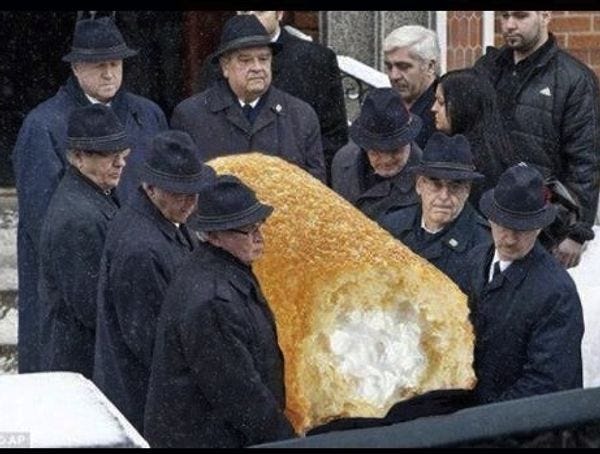‘The Atlantic’ Finds Hostess’s Real Victims: Private Equity Guys Who Will Probably Lose Their Investment
Now that the Hostess closure has begun to affect all of us, Jordan Weissman of The Atlantic will discuss what's really important here, namely: whose fault it is. And duh, of course it was not the Bain-style "private equity" managers for loading the shitty snack cake company up with debt and then legitimately raping it with management fees; no, it is only their fault for making "poor decisions," mostly the decisions to only slash union workers pay "a lot" instead of "maquiladora-style."
As David Kaplan chronicled at length for Fortune earlier this year, the roots of this debacle go back to when Hostess entered its first bankruptcy in 2004... A private equity company, Ripplewood Holdings, paid about $130 million dollars to take Hostess private, and the company's two major unions, the Teamsters and the Bakery, Confectionary, Tobacco Workers and Grain Millers International Union, sacrificed about $110 million in annual wages and benefits. But its labor contracts were still deeply flawed. Worse yet, the company left bankruptcy saddled with more debt than it went in with -- "an unusual circumstance that the company justified on expectations of 'growing' into its capital structure," as Kaplan put it.
What was "deeply flawed" about these contracts, given that the workers had sacrificed hundreds of millions of dollars to the corporate gods? We don't know, shh! it's a secret. What about the fact that Hostess tripled its CEO pay and increased other top executive compensation by 80% ? Were these inflated wages part of the "deeply flawed" labor contracts? No, of course not, these inflated wages were for job creators, so they were fair and square probably, but we don't know because he doesn't mention them.
Hostess didn't do much growing. It continued to lose hundreds of millions of dollars making and selling starchy snacks that much of the public had lost its taste for, while failing to launch any great new products. The interest on its loans swelled the company's debt. By January 2012, it was back in Chapter 11, trying to wrestle a new contract with more concessions from its unions.
Hostess insisted that unless workers accepted further cuts, the company would have to shut its doors for good...The bakers' union.. launched a strike last week that Hostess CEO Greg Rayburn says forced the company to take the final, dramatic step of liquidating everything and firing workers....Rayburn said Hostess was already operating on thin margins and that the strike was a final blow.
Well, if that's what the CEO says, it must be true. No need to get a quote from the labor union, just write down what the CEO says and move on. (Note: this type of practice is what leads our fiancé to say that American journalism is just slightly more qualitative than community theater. Just slightly though.) But anyway, if only the unions hadn't mistakenly believed they had some sort of "upper hand," Jordan Weissman continues, all this could have been avoided if they had just been willing to return to their shitty jobs at sub-par wages. Wouldn't the company have been doomed to collapse anyway, given that it was loaded with debt, made products that no one seemed to want, and wasn't developing anything new? And isn't the CEO ultimately responsible, since CEOs are supposed to be ultimately responsible for successes AND failures?
Who knows, not important. But the REAL TRAGEDY here is the "private equity guys" will probably lose their investment (even though as we know already, this doesn't necessarily mean they will lose any of their own money).
The private equity guys will likely lose most of their investment, since their stake in the company will be worthless. It's also not clear that the hedge funds and other lenders that supplied Hostess with its mountain of loans will fare much better.... In short: the smart money guys larded Hostess with too much debt and never figured out a real plan for fixing its business. They're coming out with a loss as a result.
As far as the unions go: You can blame them for not making enough concessions. You can blame the bakers for administering the final death blow. But you can't blame them for management's strategic incompetence, or the decision to try to run a flailing company on debt, hope, and empty calories.
There's more than enough blame in this story for everyone involved to have a taste.
"In short," he says, the "smart money guys" loaded Hostess up with debt, failed either to competently market pre-existing products or develop new ones, made poor decisions that stymied growth, gave themselves a hefty raise (though Weissman doesn't mention that), demanded (and got) wage cuts from employees the first time they went into bankruptcy, stole from employees' self-funded pensions (though he doesn't mention that either), and were already in bankruptcy AGAIN when the strikes started.
But this is still partially the WORKERS' fault because they still had contracts that were so "deeply flawed" as to afford them a near-living wage (we assume, he doesn't tell use) and they didn't agree to give up even more of their wages in return for the God-given gift of working for this mismanaged company.



But you repeat yourself.
<i>A private equity company, Ripplewood Holdings, paid about $130 million dollars to take Hostess private</i>
Ripplewood&#039;s a bunch of amatuers; the <i>real</i> smart money guys are over at Whiskeydick Enterprises.